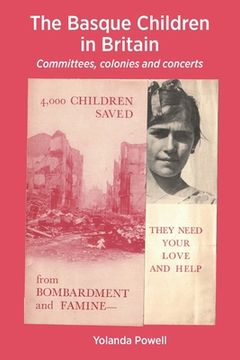Reseña del libro "The Basque Children in Britain: Committees, colonies and concerts (en Inglés)"
The Basque Children in Britain tells how and why nearly 4,000 Basque children were evacuated from the terrors of the Spanish Civil War to the relative calm of a summer camp in the south of England. They arrived at Southampton Water on 22 May 1937, barely a month after the bombing of Guernica, which so influenced British public opinion that the British government had eventually agreed to the demands of the National Joint Committee for Spanish Relief for the entry of the children, provided they did not become a charge upon public funds.The sheer scale of the undertaking was remarkable. At one stage, the children were housed in over eighty 'colonies' scattered throughout the country but the administration of this enterprise was handled by a central secretariat of only four or five people. A network of local committees sprang up, raising money and running the homes. Some homes were run very well, but others existed hand-to-mouth and provided barely enough food or attention to the children in their care.The children were supported by volunteers and funds raised from private individuals as well as organisations, such as the TUC, Independent Labour Party, and various co-operative societies. The Catholic Church looked after more than one thousand children and the Salvation Army took in several hundred for a short while.The right-wing Press and leading Establishment figures were, however, quick to oppose the continuing presence of the Basque children in Britain as soon as Bilbao had fallen to the Nationalist forces. Problems with some of the older boys led to the children being characterised as 'reds' and hooligans whom it was dangerous to keep in the country. The Catholic Church was a prime mover behind efforts to repatriate the children as quickly as possible, following the Pope's recognition of Franco's government. Disagreements over repatriation caused a deep rift between the Church and the Committees who were responsible for the children.Over time, fund-raising became more and more difficult and a key contribution to funds came from numerous concerts given by the Basque children themselves. Dressed in traditional costumes and taught by volunteers, the children performed in church halls, local assembly halls, anywhere they could find an audience - in the UK and abroad. As World War II drew closer and refugees came to Britain from other parts of Europe, the plight of the Basque children lost much of its emotional appeal. Older children in the homes were sent out to work when possible and their wages used to supplement the homes' meagre incomes. Opportunities to send children to individual families where they would no longer be a charge on the local committees were seized on with little evidence of proper investigation. A number of girls in particular found themselves working as unpaid servants in conditions more reminiscent of the Victorian age than of the twentieth century.Ultimately, most of the children were repatriated, either to Spain or to France where many parents had fled during the Civil War. Several hundred, however, stayed in Britain for the rest of their lives. Many married fellow Spaniards but not all. Having left their parents at an early age, they became emotionally distant from their families. When, years later, some met their parents once more, there had grown up between them an irreconcilable gap in culture, attitudes and experiences and the strongest emotional links were clearly now those between the children themselves.The book draws on official records, documents and correspondence of the time, and the first-hand testimony of those involved. It describes in detail the motives behind the evacuation, the financial, social, medical and political problems involved in trying to look after the evacuees - - and how the lives of the children themselves were affected by leaving behind the Basque country, their families and friends, for a 'short holiday' in Engla

